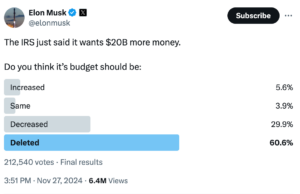Jai Hamid
Elon Musk is coming for one of Washington’s biggest targets: the Internal Revenue Service. Joined by entrepreneur Vivek Ramaswamy, the eccentric billionaire plans to gut the agency’s budget and reimagine how Americans handle taxes.
The duo’s ambitions don’t stop there. They’re orchestrating a federal spending cut of $2 trillion, tackling agencies they consider bloated or outdated via their Department of Government Efficiency (D.O.G.E).
“The IRS is a mess,” ELon has said, pointing to inefficiency and scandals that have plagued the agency for years. He’s proposing a free tax-filing app, suggesting an audit, and calling for massive layoffs to reduce what he deems “administrative overgrowth.”
He did a poll on X, asking people what he should do with the IRS, and over 60% voted to delete its budget altogether.
On top of that, D.O.G.E plans to slash federal funding for other agencies, including the Consumer Financial Protection Bureau (CFPB) and the Department of Education.
Slashing through federal spending
D.O.G.E is targeting multiple agencies and programs as part of its $2 trillion spending cut. The CFPB, a watchdog agency for financial practices, is at the top of Elon’s list. “Delete CFPB,” Elon posted on X, sparking debate about the bureau’s future.
Critics argue the agency overlaps with others, making it redundant. Project 2025, a Trump-era initiative, also pushed for its elimination.
The Department of Education isn’t safe either. Vivek has suggested “mass reductions,” going as far as saying entire agencies might be wiped out. Trump, who has advocated for the department’s dismantling for years, appears to have his allies doubling down on that goal.
Even the Pentagon’s enormous $1 trillion budget isn’t off-limits. Vivek has criticized the Department of Defense for what he calls rampant waste. He claims the Pentagon burns through $125 billion annually on bureaucracy.
Ironically, Elon’s SpaceX, with its $3.6 billion in federal defense contracts, hasn’t come under the knife—yet. D.O.G.E also has plans to redirect $535 million currently allocated to the Corporation for Public Broadcasting (CPB), which oversees PBS and NPR.
Elon and Vivek argued in a Wall Street Journal op-ed that this funding isn’t authorized by Congress. They view it as another example of reckless federal spending.
IRS in the crosshairs
According to Wall Street Journal sources, Elon has been in talks to develop the government-backed tax-filing app. The idea? Streamline tax season and cut out third-party services like TurboTax, which have faced allegations of misleading taxpayers.
Elon and his D.O.G.E team want to simplify the tax code altogether, making it less painful for the average American. The IRS has long been a lightning rod for criticism.
In 2013, it was accused of politically targeting conservative tea party groups, leading to public outrage and congressional investigations. Ernst, who heads the DOGE caucus in the Senate, called the agency a symbol of inefficiency. “The IRS wastes taxpayer money. It’s time for accountability,” she posted on X.
D.O.G.E’s plans include auditing the IRS and reviewing its spending. Elon and Vivek want to cut its workforce, eliminating what they call “administrative overgrowth.” Elon also suggested relocating agencies like the IRS out of Washington, hoping to shrink its influence and operational costs.
D.O.G.E’s aggressive strategy could lead to significant job losses. Elon and Vivek have proposed embedding D.O.G.E appointees in agencies to assess minimum staffing needs. The goal is simple: find out who’s essential and fire the rest.
“Large-scale firings” are part of the plan, along with severance payments and incentives for early retirement. Elon has also suggested imposing a strict return-to-office policy for federal workers, requiring them to show up five days a week. He expects many will quit voluntarily.
The Department of Justice, Federal Trade Commission, and Securities and Exchange Commission are also on D.O.G.E’s radar. While specific plans for these agencies haven’t been revealed, cuts are expected.
Beyond that, the agency has also faced accusations of mismanagement and inefficiency. Critics point to outdated technology and delays in processing tax returns. In November 2024, a former IRS employee pleaded guilty to filing fraudulent tax returns, adding to the agency’s list of problems.
Fraudulent tax preparers are another issue. A 2014 study showed many preparers filed incorrect returns, often inflating refunds. Attempts to regulate these practices have faced legal challenges, leaving taxpayers vulnerable to scams.
The IRS has also been accused of disallowing claims without proper justification, particularly during the COVID-19 pandemic.
These controversies have eroded public trust. Elon’s criticism aligns with a broader sentiment that the IRS is overstaffed, inefficient, and prone to abuse.
From Zero to Web3 Pro: Your 90-Day Career Launch Plan
